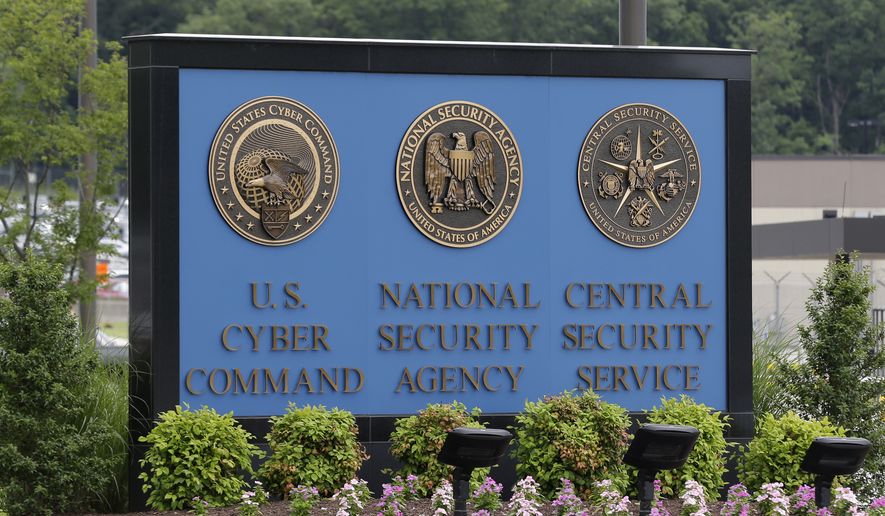A federal appeals court dealt a blow last week to a legal challenge of the National Security Agency’s phone snooping program, ending a ban on data collection involving the plaintiffs and remanding the lawsuit to a lower court for further proceedings.
But what will become of the lawsuit, brought by conservative activist lawyer Larry Klayman, could be determined as soon as Wednesday.
U.S. District Court Judge Richard J. Leon, who in 2013 issued an injunction finding the bulk data collection program likely unconstitutional, has scheduled a status conference in the case for Wednesday.
On Friday, a three-judge panel for the U.S. Court of Appeals for the D.C. Circuit rejected a preliminary injunction issued by the lower court, ruling that Mr. Klayman never proved that his calls were scooped up in the phone records dragnet.
Without being able to prove that his records were involved — because the government has never acknowledged how broadly its searches go — Mr. Klayman wasn’t able to make his case, the judges concluded.
“Plaintiffs complain that the government should not be allowed to avoid liability simply by keeping the material classified. But the government’s silence regarding the scope of bulk collection is a feature of the program, not a bug,” Judge Stephen F. Williams wrote.
SEE ALSO: NSA phone-snooping program approved through November
But just because no evidence had been confirmed did not mean it could not be found, the judge wrote, leading to his decision to remand the case rather than dismiss it.
“It remains possible that on remand plaintiffs will be able to collect evidence that would establish standing,” Judge Williams wrote. “Indeed, noting that the government was ’uniquely in control of the facts, information, documents, and evidence regarding the extent and nature of their mass surveillance,’ they moved in the district court to depose ’an employee of the NSA.’ But the district judge denied the motion as moot after granting the preliminary injunction.”
Judge David Sentelle was less convinced of the claims made in the case, however, writing that the plaintiffs “have not demonstrated that they suffer injury” and noting in a partial dissent that he believed the case should have been dismissed altogether.
Judge Janice Rogers Brown also agreed that the case should be remanded.
Mr. Klayman said Friday’s ruling did nothing to dissuade his belief that his case would ultimately prevail, saying he now hopes to begin pursuing evidence discovery now that the cases has been remanded.
“We’re confident in winning in the end,” Mr. Klayman said. “When it goes back, there are lots of ways to skin the cat. We need to show that they have our records, and that’s not going to compromise national security. Or Judge Leon can call the NSA into his chamber and get the information.”
The NSA’s program has allowed the FBI to obtain orders from the secret Foreign Intelligence Surveillance Court directing phone companies to turn over to the government telephone “metadata” — incoming and outgoing phone numbers dialed, and the times and duration of calls. Launched after the Sept. 11, 2001, terrorist attacks, the program was first detailed in leaks by former NSA contractor Edward Snowden in 2013.
Friday’s decision did not weigh in on the legality of the phone snooping program, and Alex Abdo, staff attorney with the ACLU’s Speech, Privacy, and Technology Project, said it still keeps the heart of the lawsuit in tact.
“Today’s ruling is merely a procedural decision that does not address the constitutionality or legality of the NSA surveillance program,” Mr. Abdo said. “Only one appeals court has weighed in on the merits of the program, and it ruled the government’s collection of Americans’ call records was not only unlawful but ’unprecedented and unwarranted.’”
The only appeals court to issue a decision on that the legality of the NSA program was the 2nd U.S. Circuit Court of Appeals, which in May ruled that the program “exceeds the scope of what Congress has authorized” under the USA Patriot Act. The court, however, stayed its own injunction in anticipation of action by Congress.
This summer, Congress approved the USA Freedom Act, which dramatically scaled back the NSA program. The legislation, signed by President Obama, will have private phone companies retain the data and allow the NSA to obtain information in only specific cases involving targeted individuals and with permission from a federal court. The act allowed for a 180-day transition period, but action was required by the Foreign Intelligence Surveillance Court to keep the authority active during that time. The secretive federal court, which is tasked with overseeing U.S. spying operations, on Thursday issued its final order keeping the program active through Nov. 28.
With the phone-snooping program still active, privacy advocates continue to fight the surveillance activities.
On Wednesday, the ACLU also will be back before the 2nd Circuit to argue for a preliminary injunction that would ban the government from collecting phone records under the surveillance program.
“The government is still collecting Americans’ phone records in bulk and they plan to do so until the end of November, so the lawsuits are still very much alive, unfortunately,” Mr. Abdo said.
• Stephen Dinan contributed to this report.
• Andrea Noble can be reached at anoble@washingtontimes.com.




Please read our comment policy before commenting.